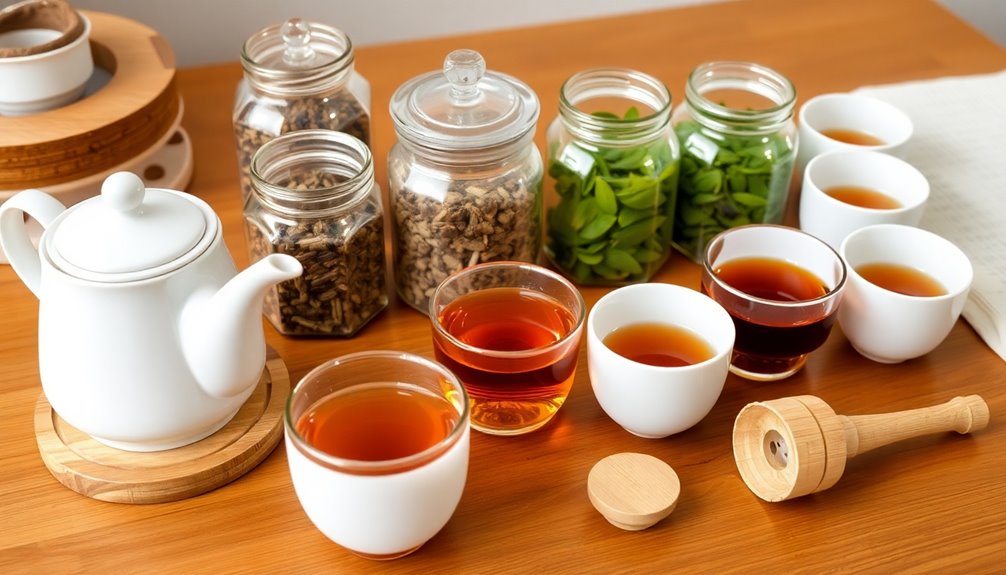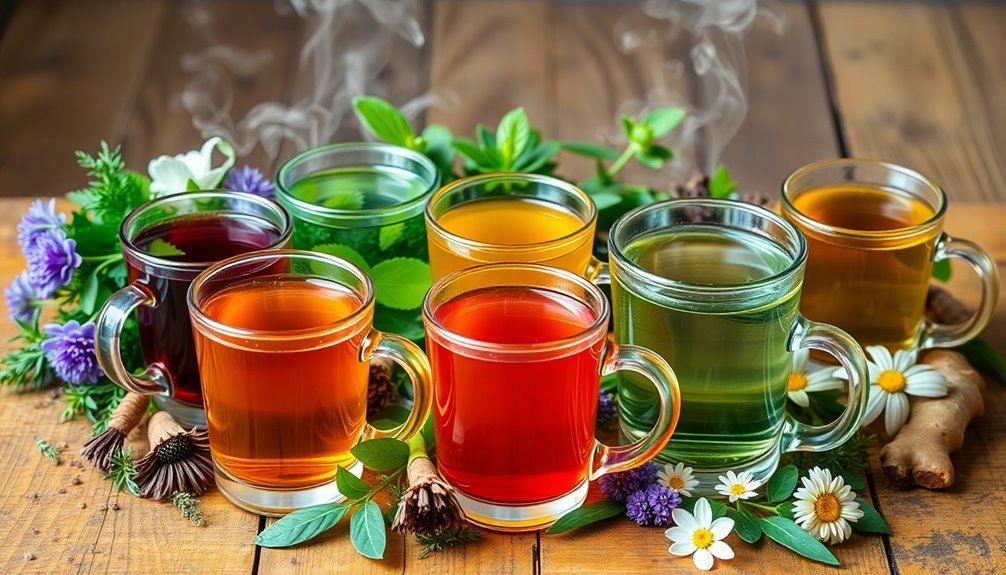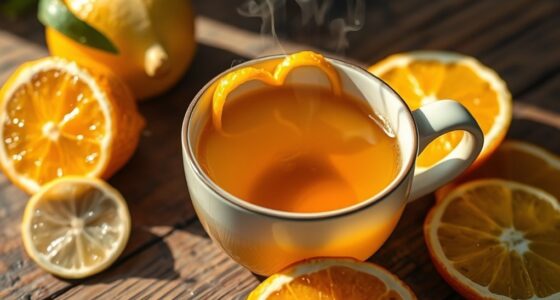Can tea really replace vitamins? Well, while tea is a delightful drink rich in health perks, it can't take the place of essential vitamins and minerals your body needs. Drinking 2-3 cups of tea daily is beneficial, but it may reduce how well you absorb certain nutrients, like iron and folate, especially if you drink it during meals. So, it's important to enjoy tea with a balanced diet full of whole foods. Remember, tea works best alongside your vitamins, not as a substitute! If you're curious about more ways tea can support your health, just keep reading!
Key Takeaways
- Tea offers health benefits but cannot replace essential vitamins and minerals necessary for overall nutrition.
- Nutritional deficiencies require dietary supplements; tea should complement a balanced diet rich in whole foods.
- Tea inhibits the absorption of nonheme iron and folate, potentially impacting individuals with anemia.
- Tannins in tea can bind to minerals like zinc and calcium, complicating nutrient absorption when consumed with meals.
- While tea has antioxidant properties, healthy adults should balance tea intake to optimize nutrient absorption and health benefits.
Introduction

In today's health-conscious world, many people wonder if their favorite brew, tea, can replace essential vitamins. You might enjoy sipping on a warm cup, thinking it could provide all the nutrients you need. While tea does have some amazing benefits, like polyphenols that help keep your heart healthy, it can't take the place of vitamins and minerals.
Drinking 2-3 cups of tea a day can help lower blood cholesterol and blood pressure, making it a great addition to your balanced diet. However, it's important to remember that tea isn't a substitute for dietary supplements. You still need those vital nutrients to stay healthy!
Sometimes, drinking tea can even affect how well your body absorbs certain nutrients, like iron and folate. That's why experts suggest enjoying tea alongside a diet rich in whole foods instead of relying solely on it for your vitamin needs.
Tea's Vitamin Absorption Impact

Tea can be a delightful addition to your daily routine, but it's important to understand how it might affect your body's ability to absorb certain vitamins and minerals.
While sipping on your favorite brew, you mightn't realize that tea can inhibit the absorption of nonheme iron and folate. This is especially true for those with iron-deficiency anemia, as studies show tea can lower iron bioavailability.
The catechins in tea might also reduce folate levels, which could create health concerns. Plus, tannins found in tea can bind to important minerals like zinc, magnesium, and calcium, making it harder for your body to absorb them when you drink tea close to mealtime.
But don't worry! Healthy adults with normal iron levels usually don't have to fret about tea affecting their absorption.
However, if you have nutritional deficiencies, like low iron, you might want to keep an eye on your tea intake.
Overall, tea has many health benefits, but understanding its impact on vitamins and minerals can help you make the best choices for your health!
Tea Affects Vitamin Bioavailability

Understanding how tea affects vitamin bioavailability is crucial for anyone looking to optimize their nutrition. When you sip on your favorite tea, you mightn't realize it can impact how your body absorbs certain vitamins and minerals.
For instance, tannins, found in tea, can reduce iron absorption, especially if you're at risk of iron deficiencies. But don't worry! Healthy individuals usually aren't affected much.
Also, studies show that drinking a lot of tea might lower folate levels, which is important for your body. A systematic review found that while tea can inhibit non-heme iron absorption, most healthy adults can still maintain good nutritional status.
Plus, it can affect minerals like zinc and magnesium, but again, this isn't a big concern for everyone. Additionally, the traditional tea ceremony emphasizes mindfulness, which can help in maintaining a balanced approach to your overall diet.
It's important to think about your overall diet and nutrient needs when enjoying tea. If you're mindful of your tea consumption, you can still enjoy its deliciousness while keeping your health in check.
Tea's Tannins Inhibit Nutrient Absorption

Tannins in tea can significantly inhibit nutrient absorption, posing a concern for those who rely on plant-based iron sources. When you drink tea close to mealtime, those tannins can bind to iron, making it harder for your body to absorb it—especially non-heme iron, which comes from plants. This could reduce iron absorption by up to 80%!
For healthy adults with normal iron levels, tea consumption usually isn't a big deal. However, if you have iron-deficiency anemia, those tannins might create some challenges.
But that's not all! Tannins can also affect folate. Research shows that green tea extract can lower folate bioavailability, which is important for your overall health.
So, if you're enjoying a cup of tea, just keep an eye on your health status. If you eat iron-rich foods or take dietary supplements, think about how tea might influence your nutrient absorption.
Balancing your tea consumption with your meals can help you get the most out of your food. So, enjoy that lovely cup of tea, but remember to think about when you drink it in relation to your meals!
Tannins vs. Nutrient Efficacy

When you sip on that comforting cup of tea, you may not realize the complex interaction between tannins and nutrient absorption happening in your body. Tannins are natural compounds in tea that can bind to important minerals, like iron and zinc, making it harder for your body to absorb them. This is especially true if you drink tea right after a meal. If you're someone with iron-deficiency anemia, this could be a concern.
However, healthy adults with normal iron levels generally don't face risks from regular tea consumption.
Interestingly, research shows that catechins in tea can also reduce folate levels, another important nutrient. But don't worry too much! Most studies suggest that the health benefits of tea, like its amazing antioxidant properties, might outweigh these risks.
Practical Applications

Tea offers more than just a comforting experience; it can also play a role in your overall health strategy. Drinking 2-3 cups of tea a day can bring health benefits that help reduce the risk of heart disease and diabetes. Isn't that amazing? Additionally, certain types of tea, like green tea, can be rich in antioxidants similar to those found in honey varieties known for their health benefits.
Green tea, in particular, is packed with polyphenols and flavonoids, which are powerful antioxidants. These help your body fight off bad stuff, just like some vitamins do! Incorporating visualization techniques while enjoying your tea can enhance your overall wellness experience. Furthermore, aromatherapy can also be utilized to promote relaxation and emotional well-being, providing an additional layer of health support.
However, it's important to remember that tea shouldn't replace vitamins entirely. If you have specific nutrient deficiencies, you might still need supplements.
Also, the way you brew your tea matters! Proper steeping helps release those beneficial compounds, making every cup a little health booster.
While enjoying your tea, keep in mind that moderation is key. Observational studies show that drinking too much hot tea could increase certain cancer risks. So, sip wisely! Additionally, incorporating regular exercise into your routine can enhance the overall health benefits you receive from tea.
Frequently Asked Questions
Does Tea Stop You From Absorbing Vitamins?
Yes, tea can hinder vitamin absorption, especially non-heme iron. Tannins bind to minerals, reducing their bioavailability. To minimize this effect, wait an hour after drinking tea before eating or taking supplements.
Does Tea Really Have Medicinal Properties?
Yes, tea does have medicinal properties. You'll find that its antioxidants can improve heart health and possibly reduce disease risks. However, it shouldn't replace a balanced diet rich in essential vitamins and minerals.
Is Tea a Good Source of Vitamins?
Tea isn't a significant source of vitamins. While it offers some beneficial compounds, you shouldn't rely on it for your daily vitamin needs. Focus on a balanced diet with fruits, vegetables, and whole grains instead.
Which Tea Has the Most Polyphenols?
If you're looking for the tea with the most polyphenols, green tea's your best bet. It's packed with catechins, especially EGCG, offering powerful antioxidants that can boost your health when consumed regularly.
Conclusion
In conclusion, while tea is delicious and refreshing, it can't fully replace vitamins in your diet. The tannins in tea might keep some nutrients from being absorbed, so it's important to enjoy tea alongside a variety of healthy foods. By doing this, you can get all the vitamins your body needs to stay strong and happy! So, sip your tea and remember to munch on fruits and veggies for the best of both worlds!










